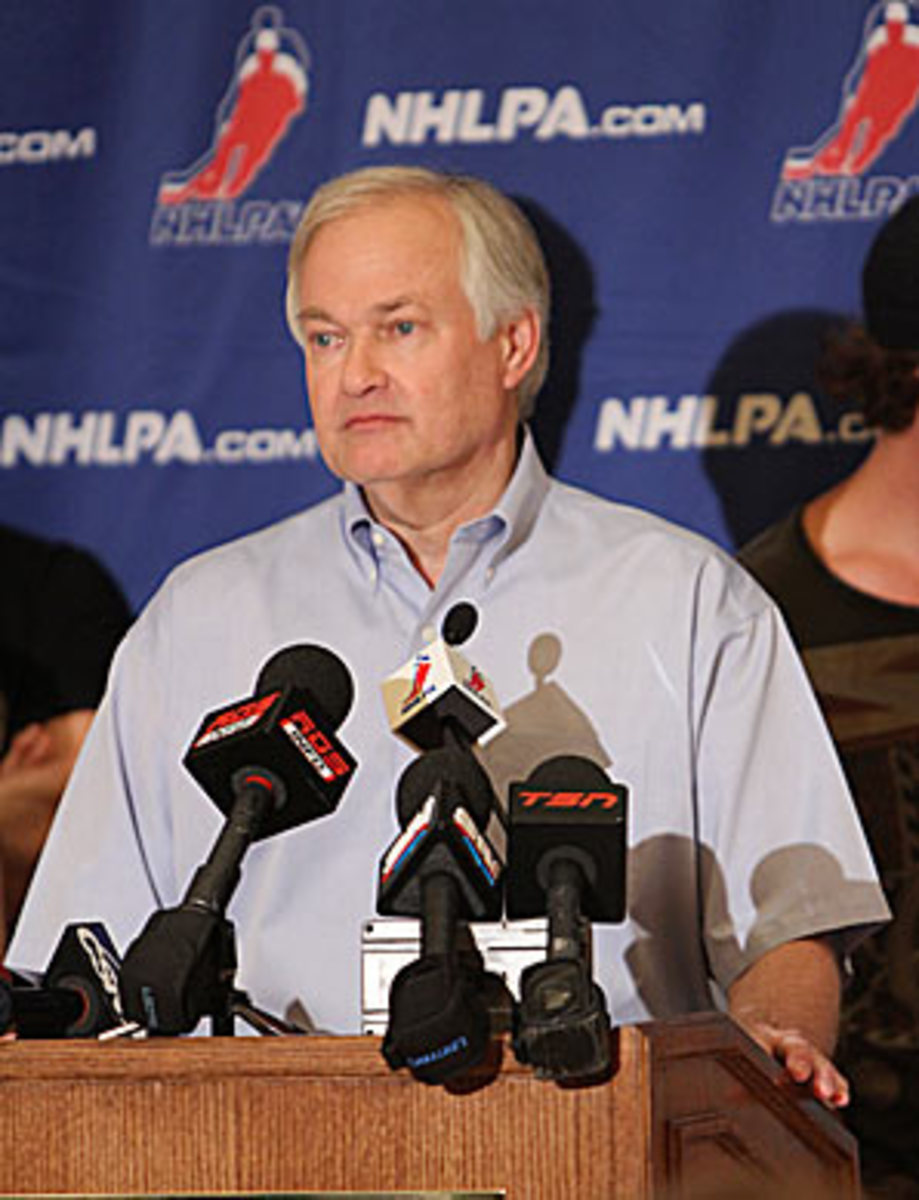Fehr to NHL: Don't expect NHLPA to cave this time


From a Chicago hotel room in which his phone died at one point and had moments in which he couldn't hear what was being said to him because of bad connections, NHL Players Association boss Donald Fehr was otherwise loud and clear on Friday afternoon:
NHL players most certainly do not want to be NHL non-players when their collective bargaining agreement expires on Sept. 15, but that they will stand strong in the Joe Hill-Norma Rae union sense this time around if they don't get a new deal that is to their satisfaction.
The once-formidable union that fractured into a cesspool of dissent and backstabbing in 2004-05 under former NHLPA boss Bob Goodenow, caving in to almost every demand made by the owners and losing a season's wages in the process, won't have any of that nonsense this time around -- at least if Fehr was to be believed on Friday.
Asked if he was already feeling any pressure from the players -- especially veterans who lost a year's worth of paychecks during that cancelled season -- to essentially cut a deal that might be less than their current proposal to the owners, Fehr was succinct:
"No," he said.
An awkward pause was followed by a "Hey, does that not surprise you at all?" Then Fehr began to elaborate on why the players will be more unified this time.
"No players would like to miss games, and I think players who were in the lockout the last time are particularly sensitive to that," he said, adding that all union members recognize what it means when the owners come in to the talks and essentially say that the players must take another salary reduction that is even larger than the last one. That time, the NHLPA accepted a salary cap and a 24-percent pay cut. The NHL has had record revenues every year since then. Even so, the owners are now also asking the players who held out the last time to give back the gains they made in terms of free-agency mobility.
Some people still see a reason for optimism that a deal will be reached sooner rather than later. Others see just the opposite. But to sum up, the situation is this:
The NHL and its players agree that times are financially better than they've ever been. This fact is the main basis for the optimism that, while a lockout may happen and wipe out the first part of the season, it won't claim the whole schedule. (Because a season has been squandered before, everyone who loves the game easily gets into a state of panic that it will happen again.) How to divvy up the spoils of the increased revenue ($3.3 billion in 2011-12, compared to $2.2 billion the year after the 2004-05 lockout) is where the big fight will happen. Players currently receive 57-percent of hockey-related revenues (HRR), which means they got $1.89 billion this past season.
The optimists who don't foresee a long lockout are quick to cite the NBA work stoppage of 2011, with its players eventually agreeing to a 50-50 split of overall revenue. Others are quick to cite a similar arrangement in the NFL, which had its own short lockout that year.
Fehr was waiting for the inevitable questions of "Hey, why can't you guys just take the same deals that the NBA and NFL did?" and "Why should hockey be any different?" Those are things that NHL Commissioner Gary Bettman essentially said when he rejected the NHLPA's counter-proposal this week. (Of course, the NBA's revenues are about double the NHL's, and the NFL's are about triple.)
"Well, look, I am sure from an owner's standpoint any number below 57 looks better than 57 and the farther you get below 57, the better it looks," said Fehr, who mentioned that he will likely talk with Bettman informally this weekend before the official CBA talks resume on Wednesday in Toronto. "But the economic systems are different in the various sports. The football (revenue) number is not based on the same revenue definitions, even remotely."
Fehr essentially dismissed comparisons to the NBA because of the huge difference in revenue (fewer players than the NHL; a much higher average salary even with a 50-50 split) and he couldn't resist touting the one CBA in American pro sports that seems to work best right now: Major League Baseball's
"It has no cap, it does have substantial revenue sharing, it has rapidly increasing franchise values and it's completely stable from a labor relations standpoint," he said. "All the threats of lockouts and shutdowns have come from the cap sports in the last 15 years. So I understand why (NHL owners) would say that, but we don't think that merely because another sport does something, we should do it in hockey any more than because baseball does something we should necessarily do it in hockey."
Fehr pointed out that the actual "market value" of NHL players is higher than 57 percent, but that's based on the last CBA agreement, as 57 is the number that players have agreed to live with.
So, will we still see an inexorable slide closer to a 50-50 split? That all depends, of course, on whether the players will bend like last time.
But listening to Donald Fehr, even on a scratchy phone connection, the answer right now seems a resounding: "No."
